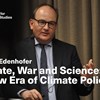staying

Voting behavior, policy responsiveness and democratic anger. Interview with Armin Schäfer
European citizens with low socio-economic status are staying away from the polls in disproportionate numbers. Some of them say it is because politicians don't care about them anyway. Are they right? P
Lukas H. Meyer: Fairness is most relevant for country shares of the remaining carbon budget
Lukas H. Meyer, Professor of Philosophy at the University of Graz, Austria, and Speaker of the Field of Excellence Climate Change Graz, the Doctoral Programme Climate Change, and the Working Unit MoraIn my talk I argue that fairness concerns are decisive for eventual cumulative emission allocations shown in terms of quantified national shares.I will show that major fairness concerns are quantitatively critical for the allocation of the global carbon budget across countries. The budget is limited by the aim of staying well below 2°C. Minimal fairness requirements include securing basic needs, attributing historical responsibility for past emissions, accounting for benefits from past emissions, and not exceeding countries’ societally feasible emission reduction rate. The argument in favor of taking into account these fairness concerns reflects a critique of both simple equality and staged approaches, the former demanding the equal-per-capita distribution from now on, the latter preserving the inequality of the status-quo levels of emissions for the transformation period. I argue that the overall most plausible approach is a four-fold qualified version of the equal-per-capita view that incorporates the legitimate reasons for grandfathering.

Ottmar Edenhofer: A New Era of Climate Policy
Research seminar with Ottmar Edenhofer, who is Director and Chief Economist of the Potsdam Institute for Climate Impact Research as well as Director of the Mercator Research Institute on Global Common
Ottmar Edenhofer: Climate, War and Science. Practical Dilemmas, Theoretical Challenges and a New Era of Climate Policy
Venue: Institutet för framtidsstudier, Holländargatan 13 , 4th floor in Stockholm, and online REGISTER >Research seminar with Ottmar Edenhofer, who is Director and Chief Economist of the Potsdam InstAbstractStarting by stating the current status quo of climate change, the talk focuses on the practical dilemmas an ambitious climate policy is facing, also on the grounds of the theoretical challenges involved. The present geopolitical global situation is calling for a new era of climate policy. But how do we get there?
Lobbying for profits
If a social scientific observer of the mid-1980s had been presented with a line-up of rich Western countries – say Germany, Sweden, the UK, France, the US – and asked to guess which of these countrie
Pathlength scaling in graphs with incomplete navigational information
2011. Physica A 390:3996-4001. The graph-navigability problem concerns how one can find as short paths as possible between a pair of vertices, given an incomplete picture of a graph. We study the navigab
Benefiting from Injustice and the Common-Source Problem
Ethical Theory and Moral Practice, pp 1-15, https://doi.org/10.1007/s10677-017-9845-7. Abstract According to the Beneficiary Pays Principle, innocent beneficiaries of an injustice stand in a special mora
Do Offenders Deserve Proportionate Punishments?
Criminal Law & Philosophy Abstract The aim of the paper is to investigate how retributivists should respond to the apparent tension between moral desert and proportionality in punishment. I argue th

New Methods for Sharing Research Findings with Society
Finding new formats for presenting policy-relevant research results.
Simone Abram: Caring and sharing: Democratic imaginaries in question
Dr Simone Abram, Department of Anthropology, Durham University ABSTRACT Within the broad term 'democratic state' there is a messy set of imagined virtues, vices and possibilities. In this paper, I consi








